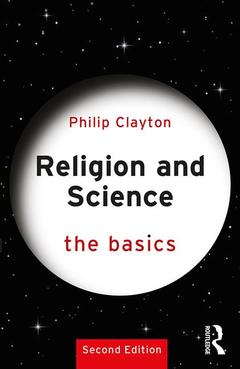Religion and Science: The Basics (2nd Ed.) The Basics The Basics Series
Auteur : Clayton Philip

Religion and science are arguably the two most powerful social forces in the world today. But where religion and science were once held to be compatible, many people now perceive them to be in conflict. This unique book provides the best available introduction to the burning debates in this controversial field. Examining the defining questions and controversies, renowned expert Philip Clayton presents the arguments from both sides, asking readers to decide for themselves where they stand:
? science or religion, or science and religion?
? history and philosophy of science
? the role of scientific and religious ethics ? modifying genes, extending life, and experimenting with human subjects
? religion and the environmental crisis
? the future of science vs. the future of religion.
Thoroughly updated throughout, this second edition explores religious traditions from around the world and provides insights from across the sciences, making this book essential reading for all those wishing to come to their own understanding of some of the most important debates of our day.
Preface
1. The basic question: science or religion, or science and religion?
The debate that no one can avoid
A naturalist and a theist in debate
Taking stock
2. Expanding the options
Theism and naturalism at odds
God, design, and delusion
A broader (and more interesting) exchange
Constructive skepticism: Michael Shermer
Theistic evolution: Francis Collins
Agnostic naturalism: Neil DeGrasse Tyson
New vistas
3. Science and the world’s religions
Christianity
Judaism
Islam
Hinduism
Buddhism
Conclusions and further questions to explore
4. Physics
Why the religious interest in cosmology?
Fundamental physics
Fine-tuning and the multiverse
What physics does and doesn’t show
5. The biological sciences
The origins of life
Evolution and creation
Are genes the fundamental units of evolution?
Are humans unique?
6. The neurosciences
Brains, minds, and consciousness
Can thoughts and intentions do anything?
Whatever happened to the soul?
Challenging the boundaries between mind and brain
Religious experience
7. Religion and science in historical and philosophical perspective
The history of religion and science
Are science and religion intrinsically at war?
The philosophy of science
Is science really objective?
Separationists and Integrationists
Change the names, solve the problem?
8. Science, technology, and ethics
Stem cell research
Modifying our genes
Ethical issues at the end of life
The rights of subjects in scientific experiments and medical care
Warfare technologies
9. The future of science and religion
Summarizing the options
Making the case for partnerships
They’re your questions now...
Glossary
Index
Philip Clayton is Ingraham Professor and Director of the Center for Spirituality and Sustainability at Claremont School of Theology, and affiliated faculty at Claremont Graduate University, USA. Author or editor of several dozen books, he is widely recognized internationally as a leading figure in the field of religion and science.
Date de parution : 09-2018
12.9x19.8 cm
Disponible chez l'éditeur (délai d'approvisionnement : 14 jours).
Prix indicatif 25,19 €
Ajouter au panierDate de parution : 09-2018
12.9x19.8 cm
Disponible chez l'éditeur (délai d'approvisionnement : 14 jours).
Prix indicatif 117,69 €
Ajouter au panierThèmes de Religion and Science: The Basics :
Mots-clés :
Star Dust; Religion and science; Person’s DNA; Science and religion; CRISPR; religious ethics; Vice Versa; technology; Agnostic; philosophy of science; Religion Science Debate; philosophy of religion; Religion Science Discussion; stem cell research; World’s Major Religious Traditions; artificial intelligence; World’s Religious Traditions; designer drugs; Engaged Buddhism; the new atheists; National Academy; Fine Tuning Argument; Science Religion Relationship; Dependent Arising; Intelligent Design; Id Science; ABC Weapon; CRISPR Technology; Multiverse Theory; WMAP Satellite; Mental Experiences; Bilipid Membrane; Wigner’s Friend; Intelligent Design Movement; Fundamental Physics



